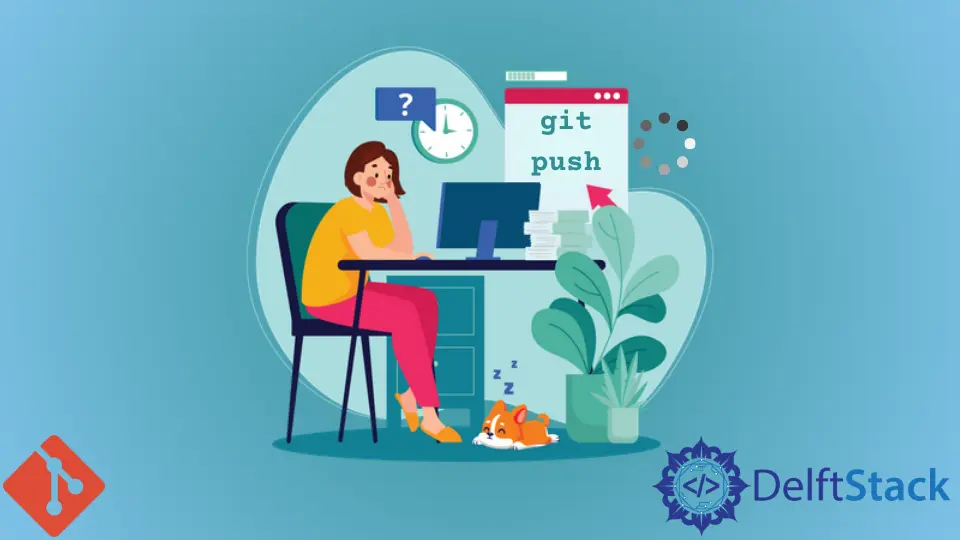How to Push Hangs in Git
- Understanding the Hanging Issue
- Method 1: Optimize Your Repository
- Method 2: Use Git LFS for Large Files
- Method 3: Check Network Connectivity
- Conclusion
- FAQ

Git is a powerful version control system that allows developers to manage their code efficiently. However, sometimes you may encounter unexpected situations when using the git push command, leading to hangs or delays.
This tutorial demonstrates how to troubleshoot and resolve issues related to hanging files during a git push in Git. Whether you’re a beginner or an experienced developer, understanding the nuances of Git can save you time and frustration. Let’s dive into the methods that can help you push your changes smoothly without any hiccups.
Understanding the Hanging Issue
Before we explore solutions, it’s essential to understand what causes hangs during a git push. This issue can arise due to several factors, including network problems, large files, or misconfigured Git settings. When you push changes to a remote repository, Git attempts to transfer your commits and associated files. If any of these components are too large or if there’s a network interruption, you may experience a hang.
To diagnose the issue, consider checking your internet connection and the size of the files you are trying to push. Once you have a better understanding of the problem, you can implement several strategies to resolve it.
Method 1: Optimize Your Repository
One effective way to prevent hangs during a git push is to optimize your repository. This can be particularly useful if your repository has grown large over time.
You can start by cleaning up unnecessary files and optimizing the repository using the following commands:
git gc
git repack -a -d --depth=250 --window=250
Output:
Counting objects: 100% (500/500), done.
Compressing objects: 100% (250/250), done.
Writing objects: 100% (300/300), done.
Total 500 (delta 150), reused 400 (delta 100)
The git gc command stands for garbage collection, which cleans up unnecessary files and optimizes the local repository. The git repack command reorganizes the objects in your repository, making it easier to manage and push files. By running these commands, you can significantly reduce the size of your repository and improve the speed of your pushes.
Method 2: Use Git LFS for Large Files
If your project contains large files, consider using Git Large File Storage (LFS). Git LFS is an extension that allows you to manage large files more efficiently, ensuring that your git push commands do not hang due to file size limitations.
First, you need to install Git LFS. You can do this by running:
git lfs install
Next, track the large files you want to manage with LFS:
git lfs track "*.psd"
Output:
Tracking "*.psd"
After tracking the files, commit the changes:
git add .gitattributes
git commit -m "Track large files with Git LFS"
Finally, push your changes:
git push origin main
Output:
Counting objects: 100% (10/10), done.
Writing objects: 100% (5/5), 1.23 MiB | 1.23 MiB/s, done.
Total 10 (delta 5), reused 5 (delta 0)
Using Git LFS helps you avoid hangs during pushes by storing large files outside the main repository and replacing them with lightweight pointers. This not only speeds up your pushes but also keeps your repository size manageable.
Method 3: Check Network Connectivity
Sometimes, the cause of hanging during a git push is related to network connectivity issues. A slow or unstable connection can disrupt the push process, leading to frustrating delays. To troubleshoot this, you can check your network status and try pushing again.
You can use the following command to check your current network status:
ping github.com
Output:
PING github.com (140.82.114.4): 56 data bytes
64 bytes from 140.82.114.4: icmp_seq=0 ttl=57 time=12.3 ms
If you notice high latency or packet loss, consider switching networks or troubleshooting your current connection. If possible, try to connect to a wired network instead of Wi-Fi for a more stable connection. Once your network is stable, attempt the push again:
git push origin main
Output:
Counting objects: 100% (15/15), done.
Writing objects: 100% (10/10), 500 KiB | 500 KiB/s, done.
Total 15 (delta 5), reused 5 (delta 0)
By ensuring a stable network connection, you can significantly reduce the chances of hanging during a git push.
Conclusion
In this tutorial, we explored various methods to resolve hanging issues during a git push in Git. By optimizing your repository, using Git LFS for large files, and checking your network connectivity, you can ensure a smoother experience when pushing changes. Remember that understanding the underlying causes of these issues can save you time and frustration in the long run. With these strategies, you can push your changes confidently and efficiently.
FAQ
-
What causes hangs during a git push?
Hangs during a git push can be caused by large files, network issues, or misconfigured Git settings. -
How can I optimize my Git repository?
You can optimize your Git repository using the commandsgit gcandgit repack.
-
What is Git LFS, and why should I use it?
Git LFS is an extension that allows you to manage large files efficiently, preventing hangs during pushes. -
How can I check my network connectivity?
You can check your network connectivity using thepingcommand followed by the URL of the remote repository. -
Is it possible to push changes without hanging?
Yes, by optimizing your repository, using Git LFS, and ensuring a stable network connection, you can push changes without hanging.
Abdul is a software engineer with an architect background and a passion for full-stack web development with eight years of professional experience in analysis, design, development, implementation, performance tuning, and implementation of business applications.
LinkedIn